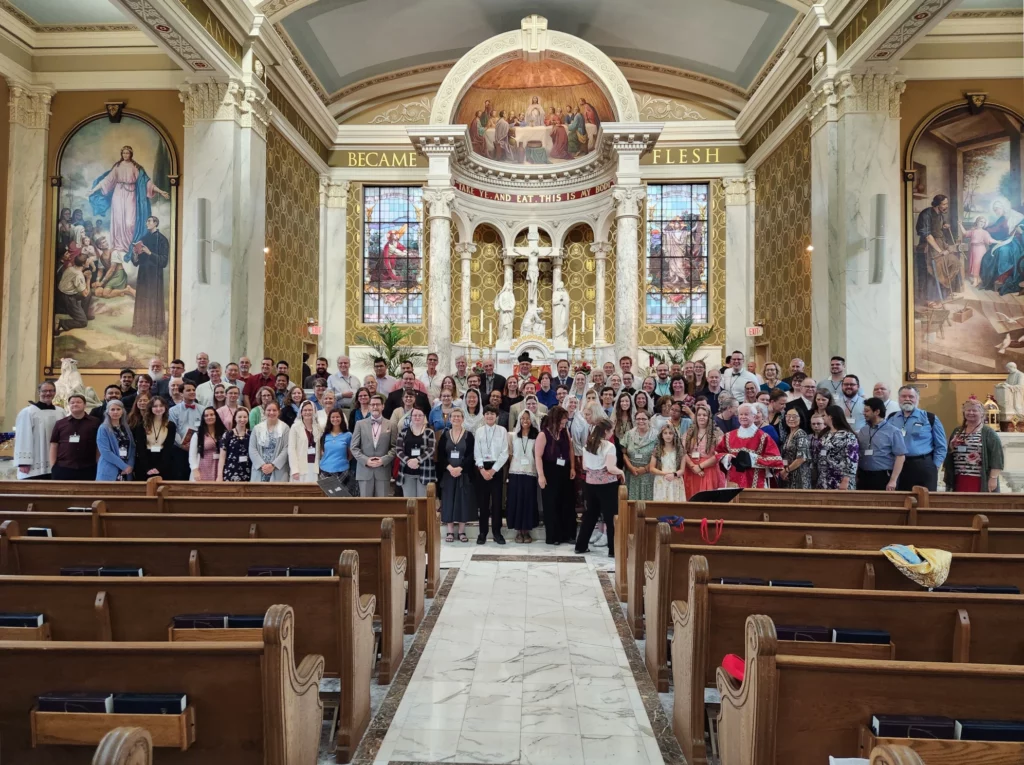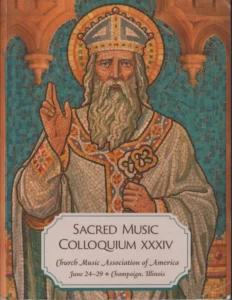Most of the repertoire for the Sacred Music Colloquium 2024 is found in the music book for the week, which is available for download.
The Colloquium this year took place at the Newman Center for the University of Illinois. This Catholic student center occupies half a city block near the heart of the campus and comprises a beautiful chapel, meeting rooms, student dormitories, and a dining hall.
Monday, June 24
At usual, the Colloquium began at dinner on Monday evening, when the Rev. Robert Pasley, CMAA’s chaplain, led us in saying grace (with the chant on page 16 of the music book) and the Veni Creator Spiritus (page 250):
In addition, since we were meeting on the Solemnity of the Birth of St. John the Baptist, we sang the vesper hymn of the feast, Ut queant laxis, which has a special significance to music history: the seven phrases of its first stanza begin with the syllables ut, re, mi, fa, sol, la, and si, which became the representatives of the seven notes of the major scale.
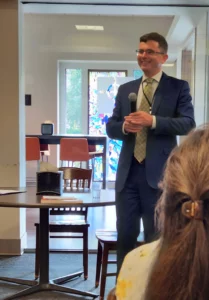
After that, CMAA board member David Hughes, director of music at Our Lady of Mount Carmel Church in Littleton, Colorado, welcomed participants and introduced the faculty for the Colloquium: that is, the directors of the polyphony choirs, the instructors of the chant scholas, and the presenters of the three plenary talks.
Fr. Pasley described the week as a spiritual retreat and invited everyone to take advantage of the opportunities it provides. He also described the five Masses that would be celebrated during the week, in various languages, and according to the current Roman Missal and the 1962 Missal.
CMAA president Professor William Mahrt spoke about the Colloquium’s purpose of helping musicians experience the Church’s ideal for the liturgy as a fully sung liturgy:
Those assembled then sang Night Prayer (page 34 in the music book), ending with the Salve Regina:
Tuesday, June 25
On Tuesday morning after the first chant rehearsals, there was an open reading session for recent compositions, this year on the theme of the Holy Spirit. The scores for these works are in the music book (linked above) starting at page 252. Some of these recordings are edited to remove interruptions and repetitions, or for reasons of time:
After our lunch break, we went to various breakout sessions — on conducting, on the history of liturgical music, on the interpretation of chant rhythm — followed by the rehearsals for the polyphony choirs.
The first Mass of the Colloquium was celebrated in English, as usual: on Tuesday afternoon, the Most Reverend Earl Fernandes, the Bishop of Columbus, offered a votive Mass of the Holy Spirit.
The Mass ordinary was sung according to Bruckner’s Windhaager Messe, and the organist was David Hughes. The introit and offertory antiphons in English are settings by Fr. Samuel Weber, OSB.
Wednesday, June 26
The first plenary address, offered by Bishop Fernandes, was a recollection of his experiences of sacred music:
On Wednesday, a Mass was celebrated in Spanish by the Rev. Cesar Serrano of the Diocese of Camden, with Dr. Aaron James, choir director of Holy Family Church in Toronto, as organist. The Mass ordinary was Misa Santiago, a new setting by Daniel Knaggs (page 90ff. in the music book), and the introit, offertory, and communion chants were arranged by Janet Gorbitz.
Thursday, June 27
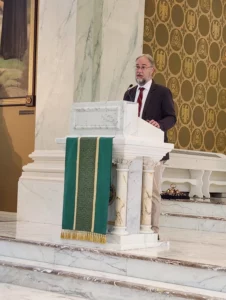
The second plenary talk was given by Gregory DiPippo, Latinist and editor of New Liturgical Movement, the liturgy blog of CMAA, on the texts of Gregorian chant. The handout of notes for his talk is available for download.
On that day, we also observed an annual tradition, a Requiem Mass for the departed members of the Association. The Mass was offered by CMAA chaplain Fr. Robert Pasley, and the three polyphony choirs sang Duruflé’s Requiem (opus 9), with organists Nathan Knutson, David Hughes, and Sam Schmitt performing with the respective choirs directed by Christopher Berry, Horst Buchholz, and Michael Olbash.
On Thursday evening Aaron James presented a recital at the Episcopal chapel that is neighbor to the Newman Center; the Chapel of Saint John the Divine is home to the Buzard Opus 7, an organ of 29 stops across two manuals and pedal, and 36 ranks, inspired by the organs of King’s College, Cambridge.
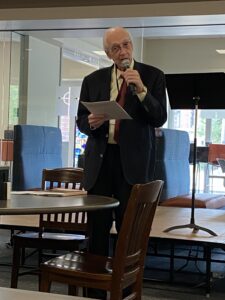
Friday, June 28
CMAA President Dr. William Mahrt presented the third plenary talk on Friday morning, on the subject of “Meditation in the Sacred Liturgy”:
The Mass on Friday, the Memorial of St. Irenaeus, bishop and martyr, was celebrated according to the modern Roman Missal by the Rev. William Morgan; the organist was Sam Schmitt.
On Friday evening, there was a solemn celebration of Vespers on the eve of the feast of the Apostles Peter and Paul. Fr. Pasley officiated at the service, and Christopher Berry was the organist.
Saturday, June 29
The closing Mass for the Colloquium was a Pontifical Mass, celebrated according to the 1962 Missal by the Right Reverend Marc Crilly, OSB, abbot of Saint Benedict Abbey in Still River, Massachusetts. The organist for the Mass was Nathan Knutson.
Breakout sessions
A few of the breakout sessions during the Colloquium were recorded; here are recordings of those we have available so far:
Dr. Jennifer Donelson-Nowicka
Music reading, theory, and solfege for parish choirs: tips for learning and teaching
(Thanks to Fiona Hughes, Sarah Mandy, Joy Niklas, Ann Pham, and Steve Quebral for sharing their photos; and to Francine Alcantara, Ann Pham, Astrid Sengkey, and Steve Quebral for their recordings.)
